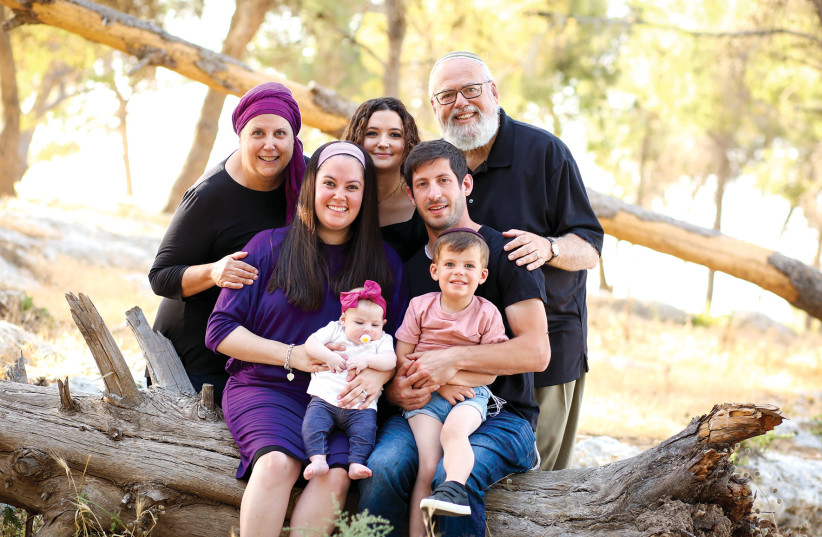I never intended to make aliyah.
Then September 11 happened, and I got the message loud and clear.
Time to leave.
It took me nine years to talk my husband into abandoning our cushy lives in America. He was an active, beloved pulpit rabbi in Baltimore. I had a fulfilling job working in adult Jewish education. Our fourth-generation American-born children were enrolled in a local Jewish day school. We had a house with hardwood floors and a fireplace, two cars, respectable incomes and money in the bank.
I wanted to make aliyah. My husband and children did not. As a compromise, we made a down payment on a small apartment in Ma’aleh Adumim in 2003. This allowed us to visit Israel with increasing frequency. And every time we did, I would start to cry a day or two before our departure flight, grieving the home I desperately wanted but didn’t yet have.

Meanwhile, I started the Baltimore Chug Aliyah, which gave me an outlet to channel my own frustrated aliyah energy. During every summer visit to Israel, we would wake up at 4 a.m. to meet one of Nefesh B’Nefesh’s aliyah flights and greet our friends who were making aliyah, one family at a time.
I despaired that it would ever be my turn.
In the end, after digesting years of my relentless Israel propaganda, our oldest daughter announced her plan to make aliyah a few months into her gap year program. And that turned out to be the catalyst for our own aliyah, three years ahead of schedule.
In a few weeks, my husband and I will celebrate our 13th aliyahversary. After nine years in Ma’aleh Adumim, we are now well-established in Efrat. Our children are married, and we have been blessed to welcome our first two Sabra grandchildren.
I came to Israel as a wide-eyed olah (immigrant). And I’ve learned a lot. Here are 13 lessons I’ve learned, one for each year we’ve been privileged to live in Israel. I offer them in no particular order, with the hope that they resonate with my fellow olim, current and future.
1. Israel is a very complicated place.
I shock myself anew every time I remember that I live in the Middle East. The history! The politics! The cultural mix! By age 30, I felt like I had mastered America. I’ve long ago accepted that I will never fully understand the nuances of this homeland of ours.
2. I will always be an immigrant.
At the beginning of my aliyah journey, when I was first falling in love with Israel, I only saw the good. Now that I have been married to Israel for quite some time, I also see its flaws. I don’t love this place any less, but there are cultural things that go on here that I will never understand.
Even though life in Israel keeps me humble, after 13 years I feel I’ve earned the right to cynically say, “Welcome to Israel,” whenever someone tells me a story of a bureaucratic snafu that defies logic.
3. One needs to see Israel through spiritual eyes to truly appreciate its beauty.
When I first started visiting Israel, in my very American way I was shocked by the dirt on the streets of Jerusalem, the stray cats everywhere, and the flies that buzzed around the baked goods in the open-air markets.
Now my eyes and ears are much more attuned to holiness, to things of beauty. A perfect lemon on a tree in a neighbor’s garden. The way the sun turns the stones of Jerusalem a particular golden hue. A flock of sheep walking in the fields beside the road on which I am driving. The Shabbat music that is played on loudspeakers in my daughter’s community just before candle-lighting time. The lone man reciting the afternoon prayers beside his car on the side of the road, just as the sun is setting.
My eyes made the switch without my conscious participation.
4. Israel touches all kinds of people in surprising ways.
As much as Israel is the Jewish homeland, it is also the biblical Holy Land. I barely knew a single serious Christian before making aliyah. Now I count among my friends dozens, if not hundreds, of Christian Zionists who love and support Israel and who want to see the Jewish people flourish here.
5. Material things matter less.
In America, we lived in a freestanding, 185-square-meter house with a full basement and a yard. I used to refer to our basement as the deferral zone because that’s where we put everything we didn’t quite know what to do with.
Today, we live in a 114-square-meter apartment. We got rid of A LOT of stuff. And in the process, I realized that we don’t actually need to hold on to 15 coffee mugs or 60 scarves or unopened makeup from 15 years ago.
Whenever we go back to America, I have to actively resist the urge to get sucked into the consumer vortex. “It’s just $1.99!” “Look at all the colors it comes in!” “This costs five times as much in Israel!” It’s so pervasive.
I was completely oblivious to the power of the consumer vortex until I moved to Israel, where shopping is utilitarian at best and certainly not a form of entertainment.
6. My soul operates on a different frequency here.
I became Torah observant in America. But I truly discovered my soul in Israel. I acquired special teachers and learning partners and learned layers and layers of Torah I simply could not have accessed from America.
Moshiach is real here. Geula (the final redemption) is real here.
My soul got an upgrade when we made aliyah, and I have been benefiting from it ever since.
7. Hebrew is still hard.
We recently moved, and while unpacking I went through an entire shelf of my Hebrew notebooks, workbooks, flashcards and audio lessons. I’ve been trying to learn Hebrew since 1989.
I have managed to learn tons of practical Hebrew vocabulary since making aliyah. I now know the difference between a mamad (safe room), a mazgan (a/c and heating unit) and a machsom (checkpoint), and I’m marginally more conversant than I was when we made aliyah but, alas, still far from fluent.
Ze ma sh’yesh (It is what it is).
8. My conversion to the metric system has been a mixed bag.
Given my lifelong familiarity with America’s imperial system, the fact that one kilogram is 2.2 pounds made it pretty easy for me to adapt to shopping in kilos. Cooking temperatures also made sense because my first oven dials in Israel were round and went to 360 degrees, so the most common cooking temperature (180 degrees C) meant a half-circle around the dial.
Estimating distance in kilometers still baffles me; my Waze app is set to miles. I prefer weather predictions in Fahrenheit because I think it’s more precise, but a friend taught me an entertaining way to estimate how the weather will feel when the temperature is expressed in Celsius.
30 is hot.
20 is nice.
10 is cold.
0 is ice.
(You’re welcome.)

9. Hessed is easier here.
Bringing a neighbor the medicine she needs. Driving a friend’s child to his afternoon activity because his mother is stuck at the office. Letting strangers stay in your apartment when you go away for Shabbat because your friend is making a bar mitzvah, and her cousin from South Africa needs a place to stay with his wife and their twin toddlers. Making a meal for someone who just had a baby. Going out of my way to drive someone to their door because it’s cold and rainy.
I’m not suggesting that people don’t do acts of kindness in other places. But in Israel, it’s embedded in the communal lifestyle we enjoy here.
10. Seasonal fruits and vegetables are better.
When we used to come to Israel to visit both in summer and winter, it baffled me why the yellow peppers were sometimes cheap and fat and sweet and plentiful and other times crazy expensive with thin flesh and little flavor. Now I understand the growing seasons and anticipate with joy when strawberries come into season and the brief window when Israeli-grown garlic will be sold in every market.
11. It’s all about networking.
I originally joined Facebook around 2006. I meant only to check it out before agreeing to let my then-high school-aged daughter get her own account. I thought it was just for kids.
Very quickly, I started to connect to lots of Israeli Anglos and, without realizing it, I began to build my Israeli network years before we actually made aliyah. I have relied on that network to learn all kinds of things one needs to know to navigate here.
When I was still running the Baltimore Chug Aliyah and dreaming that someday I would be allowed to make aliyah, I drank in every bit of information about life in Israel that I could.
Despite all my years of preparation, making aliyah as a middle-aged woman was (still is!) occasionally infantilizing. I was a very competent adult in America. And there was so much I had to relearn. How to write a check in Israel, how to make a doctor’s appointment, how to apply for a driver’s license. Each of the things that I handled effortlessly in the Old Country presented its own new challenge as I worked my way through foreign systems.
After 13 years, I’ve learned to own my immigrant limitations. As much as possible, I live in an English-speaking bubble. Some people get judgy about that.
I truly don’t care.
And when I really do have to deal with something – a website, an office visit, a call to customer service, a form – in a level of Hebrew that exceeds my linguistic mastery, I ask for help. And to my eternal delight, I always find someone who can help.
12. The most amazing people end up in Israel.
I am constantly inspired by my fellow olim. I get tremendous pleasure from inviting new people to our Shabbat table and asking them to tell the story of how they got to Israel; or why, despite everything, they stay. Their stories, the obstacles they overcame to get here, their faith in Hashem (God) make me weep with pride for my people and my Land.
13. Living in a Jewish country just never gets old.
The view of the Judean Hills from my back porch. The Chag Sameach greetings on buses and soda cans. The way the displays at grocery stores change in sync with the Jewish calendar. The way you can say “Shabbat shalom” to anyone in Israel. The sign that reads “Welcome to Jerusalem” even though we’re just going into town to grab some dinner or see a movie. The joy you feel when you hear that another Jewish person or family you know from the Old Country is making aliyah.
HAPPY ALIYAHVERSARY to us! And to all olim who preceded us and to all who will come after us, I say, “There’s no place like home!” ❖
